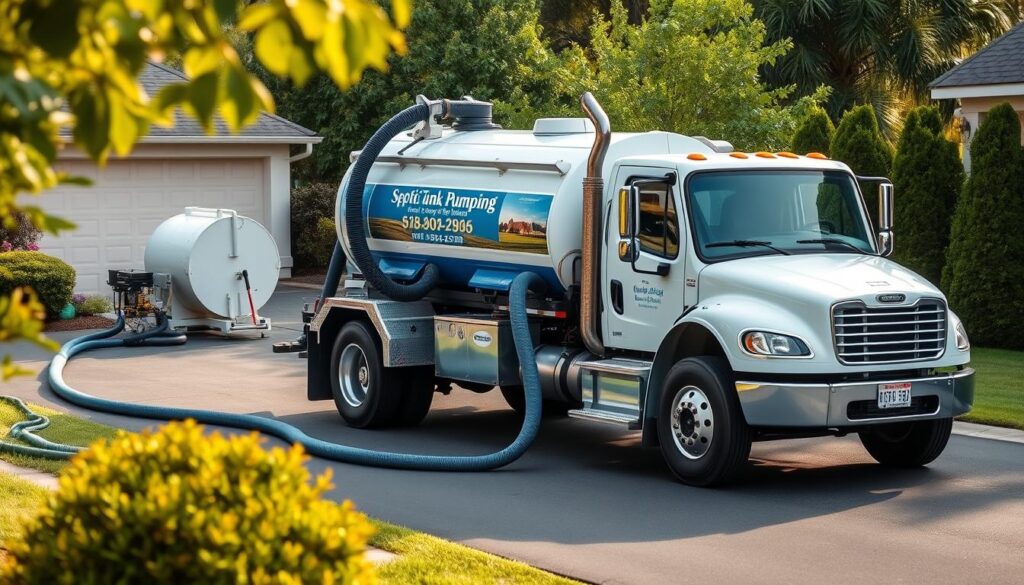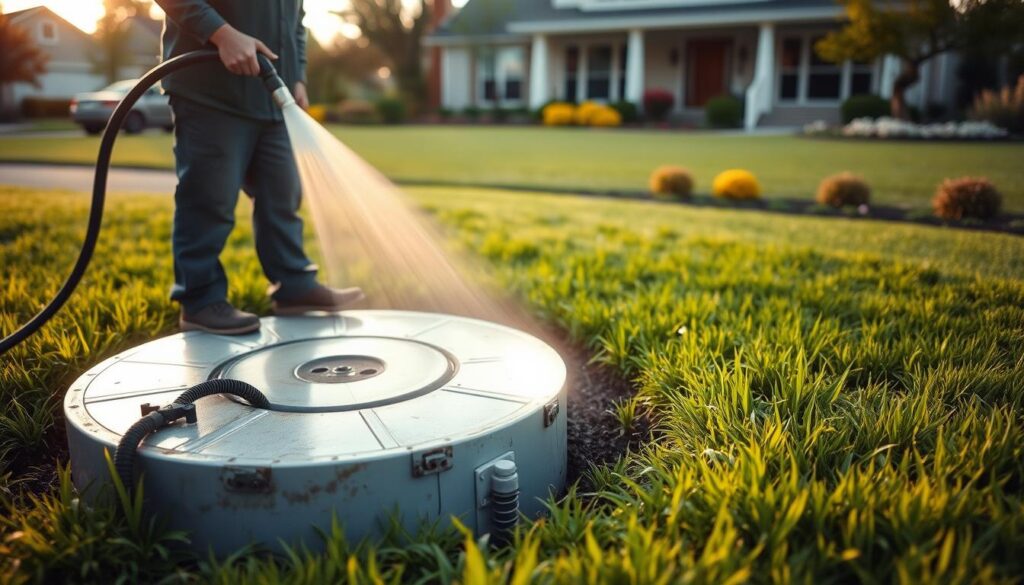Are you aware of the hidden dangers of neglecting your septic tank? Septic tank maintenance is crucial for the health and safety of your household and the environment.
A neglected septic tank can lead to costly repairs, environmental hazards, and even health risks. Regular septic tank pumping is essential to prevent these issues, ensuring your system operates efficiently and effectively.
Understanding the importance of septic tank pumping can save you from future headaches. By maintaining your septic system, you not only protect your property but also contribute to a safer environment.
Key Takeaways
- Regular septic tank pumping prevents costly repairs.
- Proper maintenance ensures environmental safety.
- Neglecting septic tank maintenance can lead to health risks.
- Efficient septic systems operate with regular pumping.
- Septic tank maintenance is crucial for household safety.
Understanding Your Septic System: The Basics
Understanding the basics of your septic system can save you from costly repairs down the line. A septic system is a complex process that involves several key components working together to treat wastewater.
How Septic Systems Work
A septic system works by separating wastewater into three distinct parts: solids, scum, and effluent. This separation is crucial for the natural breakdown process of wastewater.
The Tank and Drain Field Components
The septic tank and drain field are the primary septic system components. The tank is where the initial separation of wastewater occurs, while the drain field is responsible for dispersing the treated effluent into the soil.
The natural breakdown process involves bacteria in the septic tank breaking down the solids and scum. Regular septic tank maintenance ensures that this process is not disrupted, keeping your system functioning properly.
By understanding these basics, homeowners can better appreciate the importance of maintaining their septic systems, thereby avoiding potential issues and costly repairs.
The Importance of Septic Tank Pumping
Understanding the importance of septic tank pumping can save homeowners from potential disasters. Regular maintenance is key to extending the life of your septic system.
What Happens During a Septic Tank Pumping
During a septic tank pumping, a professional service removes the accumulated sludge and scum from the tank. This process allows for a thorough inspection of the system to identify any potential issues.
The Professional Pumping Process
A professional pumping service will use specialized equipment to pump out the tank’s contents. This ensures that the job is done efficiently and safely.
Inspection Opportunities
After pumping, the tank is inspected for any signs of damage or wear. This is also an opportunity to check the drainfield and other components of the septic system.
| Benefits of Septic Tank Pumping | Description |
|---|---|
| Prevents System Failures | Regular pumping reduces the risk of costly system failures. |
| Ensures Proper Functionality | Pumping maintains the system’s efficiency and effectiveness. |
| Extends System Life | Regular maintenance through pumping can extend the system’s lifespan. |
As emphasized by industry experts, “Regular septic tank pumping is not just a maintenance task, it’s a necessity for homeowners with septic systems.” Regular pumping is a crucial step in maintaining a healthy and functional septic system.
The importance of septic tank pumpingcannot be overstated. By understanding what happens during the pumping process and the opportunities for inspection, homeowners can better appreciate the value of this maintenance task.
5 Reasons to Pump Your Septic Tank Before It’s Too Late
Regular septic tank pumping is crucial to avoid a range of costly and hazardous consequences. Neglecting this essential maintenance task can lead to severe repercussions on your household and the environment.
Overview of Critical Consequences
The failure to pump your septic tank regularly can result in a multitude of problems, affecting not only your property but also the surrounding ecosystem. Critical consequences can arise from neglecting septic tank maintenance.
Short-term vs. Long-term Effects
In the short term, neglecting septic tank pumping can lead to issues such as slow drains and unpleasant odors. However, the long-term effects can be far more severe, including system failures and environmental contamination.
The Domino Effect of Neglect
Ignoring septic tank maintenance can trigger a domino effect, where one issue leads to another, culminating in costly repairs and potential health hazards. For instance, a neglected septic tank can overflow, affecting your yard and potentially contaminating local water sources.
| Consequence | Short-term Effect | Long-term Effect |
|---|---|---|
| System Failure | Slow Drains | Costly Repairs |
| Environmental Contamination | Unpleasant Odors | Health Hazards |
Understanding the critical consequences of neglecting septic tank maintenance highlights the importance of regular pumping. By doing so, homeowners can prevent a range of issues, from costly system failures to environmental hazards.
Reason1: Prevent Costly System Failures and Replacements
One of the primary reasons to pump your septic tank regularly is to prevent expensive system failures. A well-maintained septic system is crucial for avoiding costly repairs and replacements.
The Financial Impact of System Failure
System failure can have a significant financial impact on homeowners. The cost of repairing or replacing a failed septic system can be substantial, often running into thousands of dollars.
Repair Cost Breakdown
| Service | Cost |
|---|---|
| Emergency Pumping | $200-$500 |
| System Inspection | $100-$300 |
| Replacement Parts | $500-$2,000 |
| Total Potential Cost | $800-$2,800 |
Emergency Service Premiums
Emergency septic services often come with a premium price tag. By maintaining your septic system through regular pumping, you can avoid these costly emergency repairs. Preventing septic tank problems is not only cost-effective but also reduces the stress associated with system failures.

In conclusion, regular septic tank pumping is a proactive measure that helps prevent costly system failures and replacements. By understanding the financial impact of system failure, homeowners can take steps to mitigate these risks and protect their financial investment.
Reason2: Avoid Sewage Backups in Your Home
The consequences of neglecting your septic tank can lead to sewage backups, which are not only unpleasant but also hazardous to your health. Sewage backups occur when wastewater from your home flows back into your living spaces, often due to a clogged or overflowing septic system.
The Health Hazards of Sewage Backups
Sewage backups pose significant health risks, including the spread of diseases and infections. When sewage enters your home, it contaminates surfaces, air, and water, creating an environment conducive to the growth of harmful pathogens.
Bacterial and Viral Risks
Sewage contains a multitude of bacteria and viruses that can cause a range of illnesses. Pathogens such as E. coli, Salmonella, and Rotavirus are commonly found in sewage and can lead to severe gastrointestinal issues, among other health problems.
- E. coli: Can cause urinary tract infections and pneumonia.
- Salmonella: Known for causing salmonellosis, leading to symptoms like diarrhea, fever, and abdominal cramps.
- Rotavirus: A common cause of gastroenteritis in children.
Respiratory Concerns
In addition to gastrointestinal issues, sewage backups can also lead to respiratory problems. The mold and mildew that grow in damp environments contaminated with sewage can release spores into the air, exacerbating conditions like asthma.
It’s crucial to address sewage backups promptly to minimize exposure to these health hazards. Regular septic tank pumping is a proactive measure that can significantly reduce the risk of such backups.
Reason3: Protect Your Property Value
Ensuring your septic system is properly maintained is key to safeguarding your property’s value. A well-maintained septic system is not only a selling point but also a critical factor in maintaining your home’s overall value.
How Septic Issues Affect Home Sales
Septic issues can significantly deter potential buyers, leading to longer sales processes or even failed transactions. When a septic system is not functioning correctly, it can raise concerns about the property’s overall condition.
Buyer Hesitations and Negotiations
Buyers are often hesitant to purchase a home with known septic issues. This hesitation can lead to negotiations that favor the buyer, potentially reducing the sale price of your property. In some cases, buyers may even withdraw their offers.
Inspection Failures
A failing septic system can cause a property to fail inspections, which is a significant obstacle in the home selling process. Inspection failures due to septic issues can delay or even cancel a sale.
Impact on Property Value
| Septic System Condition | Property Value Impact |
|---|---|
| Well-Maintained | Positive Impact – Attracts buyers and supports higher property value |
| Failing or Failed | Negative Impact – Deters buyers, potentially lowers sale price |
Maintaining a healthy septic system is essential for protecting your property value. By doing so, you not only ensure a smoother home sale process but also potentially increase your property’s value.

Reason4: Safeguard the Environment and Local Water Sources
The environmental impact of septic leaks can be severe, making regular septic tank pumping essential. When a septic system fails, it can release harmful bacteria and pollutants into the surrounding soil and water.
Environmental Impact of Septic Leaks
Septic leaks can contaminate local water sources, posing a risk to both human health and the environment. The pollutants from a failing septic system can include nitrogen, phosphorus, and bacteria, which can lead to the degradation of water quality.
Ecosystem Disruption
The release of these pollutants can disrupt the local ecosystem, leading to changes in the balance of nature. For example, an overabundance of nitrogen can cause algal blooms, which can deplete the oxygen in water bodies, harming aquatic life.
Wildlife Effects
Wildlife is also affected by septic leaks. Animals that come into contact with contaminated water or soil can suffer from a range of health problems. Moreover, the disruption of habitats due to pollution can lead to a decline in biodiversity.
By maintaining a properly functioning septic system through regular pumping, homeowners can play a crucial role in safeguarding the environment and local water sources. This not only protects public health but also preserves the natural beauty and ecological balance of the surrounding area.
Regular septic tank pumping is a simple yet effective way to prevent the environmental hazards associated with septic leaks. It’s a proactive step that contributes to a healthier environment for future generations.
Reason5: Maintain Healthy Soil and Landscaping
Regular septic tank maintenance is essential for preventing damage to your yard and maintaining healthy soil composition. A neglected septic system can lead to septic overflow, which can have detrimental effects on your landscaping.
How Septic Overflow Affects Your Yard
When a septic system fails or is not properly maintained, it can cause septic overflow, leading to changes in your yard’s condition. This overflow can affect the soil in several ways.
Soil Composition Changes
Septic overflow can alter the soil composition by introducing harmful bacteria and excess nutrients. This can lead to:
- Changes in soil pH levels
- Increased risk of nutrient imbalances
- Potential for soil contamination
Plant Health Impact
The changes in soil composition due to septic overflow can directly impact plant health. Plants may suffer from:
- Nutrient deficiencies or excesses
- Increased susceptibility to diseases
- Visible signs of stress such as wilting or discoloration

By maintaining your septic system through regular pumping, you can prevent these issues and ensure your yard remains healthy and visually appealing.
Warning Signs Your Septic Tank Needs Pumping
A septic tank that is full or clogged can cause a range of problems, from slow drains to sewage backups. It’s essential to recognize the warning signs that your septic tank needs pumping to avoid these issues.
Slow Drains and Toilet Flushing Issues
One of the first signs that your septic tank is full is when you notice slow drains and toilet flushing issues. If water is taking longer than usual to drain from your sinks, toilets, and showers, it could indicate that your septic tank is nearing capacity.
Progressive Warning Signs
As the septic tank continues to fill, the problems can escalate. You might notice:
- Gurgling sounds from your drains
- Sewage odors around your home or yard
- Lush or soggy areas in your yard, even during dry weather
When to Call a Professional
If you observe any of these signs, it’s time to call a professional for septic tank pumping. Delaying can lead to costly repairs and potential health hazards.
| Warning Sign | Description | Action Required |
|---|---|---|
| Slow Drains | Water takes longer to drain | Inspect septic system |
| Sewage Odors | Unpleasant smells around the home or yard | Schedule pumping |
| Lush or Soggy Yard Areas | Unusual grass or soil conditions | Check for septic leaks |
By being aware of these warning signs and taking prompt action, you can maintain a healthy septic system and avoid more severe problems down the line.
How to Choose a Professional Septic Tank Pumping Service
To ensure your septic system operates efficiently, it’s vital to choose a professional pumping service. A reliable service provider will not only pump your septic tank but also inspect the system for any potential issues.
Qualifications to Look For
When selecting a septic tank pumping service, there are several qualifications to look for. These include:
- Licensing and certification
- Experience and specialization in septic tank pumping
- Positive customer reviews and ratings
Licensing and Certification
A professional septic tank pumping service should have the necessary licensing and certification. This ensures they are trained to handle septic systems safely and effectively. Look for certifications from reputable organizations, such as the National Association of Wastewater Technicians (NAWT).
Experience and Specialization
Experience is key when it comes to septic tank pumping. A service with a long history of operation is likely to have encountered a variety of septic systems and can handle complex situations. Specialization in septic tank pumping also indicates a deeper understanding of the specific needs of septic systems.

By focusing on these qualifications, you can ensure that your septic tank is pumped by a professional service, maintaining the health of your septic system.
DIY Septic Maintenance Between Pumpings
Maintaining your septic system between pumpings is crucial for its longevity and efficiency. Regular DIY maintenance can help prevent costly repairs and ensure your system operates smoothly.
Safe Cleaning Products for Septic Systems
Using the right cleaning products is vital for maintaining a healthy septic system. Harsh chemicals can disrupt the balance of bacteria in your septic tank, leading to system failures.
Septic-Safe Alternatives
- Use septic-safe laundry detergents and cleaning products.
- Opt for natural or biodegradable alternatives.
Products to Avoid
- Avoid using bleach or products containing bleach.
- Steer clear of chemical drain cleaners, as they can harm your septic system.
By being mindful of what you put down the drain and using septic-safe products, you can help maintain your septic system’s health between pumpings.
Conclusion: Protecting Your Investment Through Proper Septic Care
Proper septic care is crucial for maintaining a healthy septic system and protecting your investment. By following the guidance outlined in this article, homeowners can ensure their septic systems are properly maintained, avoiding costly problems down the line.
To keep your septic system running smoothly, remember to schedule regular pumping and inspections. Implementing septic tank care tips, such as being mindful of what you flush and using safe cleaning products, can also help extend the life of your system.
By prioritizing proper septic care, you not only safeguard your property value but also contribute to a healthier environment. This proactive approach to septic maintenance is a key aspect of protecting your investment and ensuring the longevity of your septic system.

